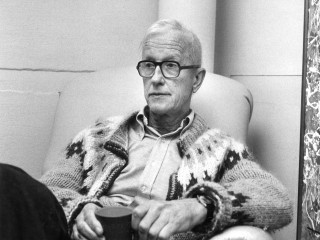
Max Delbruck biography
Date of birth : 1906-09-04
Date of death : 1981-03-09
Birthplace : Berlin, Germany
Nationality : German
Category : Science and Technology
Last modified : 2011-12-21
Credited as : biophysicist, studies into bacteriophages, Nobel laureate
0 votes so far
Max Delbrück developed a one-step process for quickly breeding bacteriophages (viruses that infect bacteria). In collaboration with Salvador E. Luria, Delbrück showed that after a bacterium has been infected, it can undergo spontaneous mutations that give it immunity to the bacteriophage. Working separately, experiments conducted by both Delbrück and Alfred D. Hershey showed that genetic material from different kinds of viruses can mingle and produce new types of viruses. For his studies into bacteriophages, Delbrück won the Nobel Prize for Medicine or Physiology in 1969, sharing the honor with Luria and Hershey.
To more casual students of science, Delbrück may be better known for coining what he called "the Principle of Limited Sloppiness", which suggests that researchers should be "sloppy enough so that unexpected things can happen, but not so sloppy that we can't find out that it did."
His father, Hans Delbrück, was a university professor, and in childhood Delbrück's family was ensconced in an upper-class neighborhood that was home to numerous academics -- Max Planck's home was within easy walking distance. World War I destroyed the neighborhood's affluence, and in World War II seven members of his extended family were executed as members of the Nazi Resistance. Additionally, two of Delbrück's brothers-in-law were killed by marauding soldiers in the last days of the war. Delbrück himself fled the Nazis in 1937.
He was the great-grandson of pioneering chemist Justus Liebig, and while studying at the University of Bristol Delbrück roomed with Cecil Powell, and became friends with three other future Nobel laureates, Patrick M. S. Blackett, Paul Dirac, and Gerhard Herzberg. In the Mel Brooks film Young Frankenstein, the scientist's assistant Marty Feldman is sent to obtain the brain of "scientist and saint" Hans Delbrück -- Delbrück's father -- but accidentally drops it on the floor. The real Hans Delbrück was a war historian who wrote several books, generally debunking much of military history and showing that regardless of arguments analyzing military strategies, the winner of any given battle is usually the side with the most troops.
Author of books:
-Mind from Matter? (1986)
-Phage and the Origins of Molecular Biology (1966, with John Cairns)
















